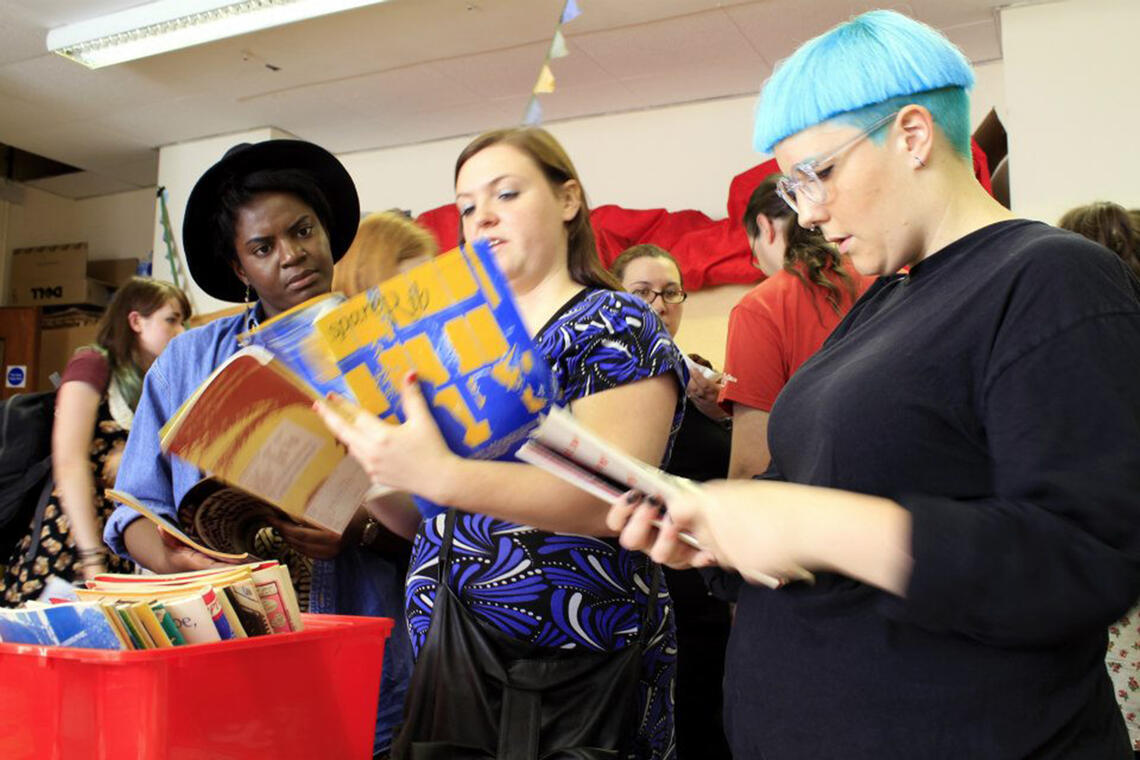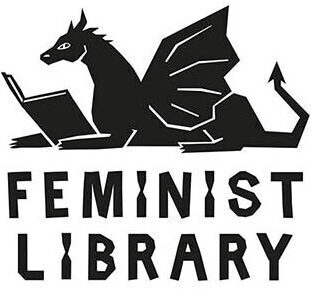
The Feminist Library is a large archive collection of feminist literature, particularly Women’s Liberation Movement materials dating from the late 1960s to the 1990s. We support research, activist and community projects in this field.
The Library is also an autonomous feminist community space. The Library is trans-inclusive, welcomes visitors of any gender, does not require registration or membership, and provides an intersectional, non-sectarian space for the exploration of feminism.
Originally known as the Women’s Research and Resources Centre (WRRC), the Feminist Library was set up in 1975, at the height of the Women’s Liberation Movement (WLM), a time of intense political campaigning and lively collective organising.
Since the Library’s beginnings, it has provided a place where women could network and educate themselves, and has become a contact point for women locally, nationally and internationally.
Today the Library continues its drive for inclusion and accessibility. The Library is run by a collective of volunteers, with a management structure committed to making decisions by consensus.
‘There is no door-to-door education that takes feminist thinking out of elite colleges and off the history page to tell folks, especially women, what it’s all about, how and where they can join, learn and transform their lives.’ bell hooks
However, since 1975, there has been the Feminist Library, which was set up by a group of women concerned about preserving the writings and the knowledge of the Women’s Liberation Movement. The library was set up during the height of the Second Wave, as there was a political imperative to provide a space for women to organise, agitate, network and share ideas in a clearly feminist space. That political imperative remains to this day.
Despite the dominant media message that there is no need for autonomous, intersectional feminist spaces, we know differently. Although feminism has achieved much, there is still much to fight for. The Feminist Library can and will provide this space.
The library is controlled by the people who use it. We intend to support today’s feminist movement by providing a space to meet and organise and research — not only to read the words of women who have gone before, who will always have the power to inspire us, but to continue collecting the output of a wide range of feminists today. The library’s continued existence is indicative of a strong contemporary movement, a movement proud of its history, which recognises the commitment, passion and diversity of us all, and the power of our words to inspire action and bring true and lasting social change.
The Feminist Library wants to be a force for good, a living breathing space with a growing collection of work that reflects the diversity of the movement we serve. We want feminists to support the library, and use it, thereby contributing to a movement as determined as ever to bring about total liberation from the forces of oppression, exploitation and hierarchy. We want feminists to send us their work so that ideas can be shared freely with the whole movement; and to use our space. We need feminists to rally behind the library and actively support us, so that together we can ensure that the Feminist Library continues to thrive, and so that we can preserve a vibrant network of feminist publishing and activism long into the future.
Originally known as the Women’s Research and Resources Centre, the Feminist Library was founded in 1975 during the height of the second wave of the Women’s Liberation Movement, a period when many women became actively involved in the struggle against sexist oppression and exploitation, and it was very much part of this process of feminist self-organisation and resistance.
The Feminist Library has had a succession of ever larger homes, including above Sisterwrite Bookshop in Upper Street, next to Spare Rib in Clerkenwell Close, and above A Woman’s Place on the Embankment, before moving to its present home in Southwark after the GLC was abolished in 1986. In common with most underfunded feminist enterprises, the Library has faced a variety of crises and uncertainties over the years, and has not been able to afford paid workers for most of its life. However, a small group of dedicated volunteers has kept it going, adding to its collection, publishing a newsletter, running the Library, and organising events. The Awards for All grant in 2010, which enabled the Librarians for Tomorrow training programme, was another sign of the future health of the Library.
The Feminist Library has been sustained for 43 years by the goodwill, passion and commitment of many individual women, and can be seen perhaps as a microcosm of the Women’s Liberation Movement: still here, still struggling, and with no intention of going away.
43 years, five small rooms, innumerable lives touched, enriched, forever changed. The passion and commitment reflected in the collection is palpable, awe-inspiring and easily matched by the history of the Feminist Library herself.
Due to the nature of the space, as an occupational requirement these roles are open to women and non-binary people only please. If you are male and would like to support the library we welcome donations which help keep the library operational: feministlibrary.co.uk/support/friends-scheme/
Please refer to our community policy which all volunteers must agree with and actively work to implement: Community Policy – The Feminist Library

